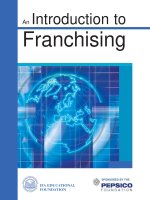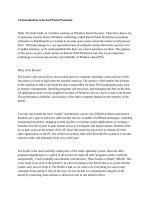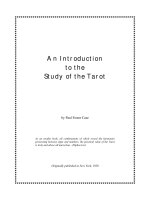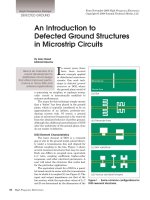An introduction to franchising
Bạn đang xem bản rút gọn của tài liệu. Xem và tải ngay bản đầy đủ của tài liệu tại đây (351.07 KB, 54 trang )
An
Introduction to
Franchising
IFA EDUCATIONAL
FOUNDATION
SPONSORED BY THE
© 2001 The IFA Educational Foundation. All Rights Reserved. No part of this book may be reproduced or trans-
mitted in any form, by any means (electronic, photocopying, recording or otherwise), without the written permission
of the publisher. IFA Educational Foundation, 1350 New York Avenue, NW, Suite 900, Washington, DC 20005,
(202) 662-0764, www.franchise.org.
An
Introduction to
Franchising
IFA EDUCATIONAL FOUNDATION
By Barbara Beshel
The Money Institute
www.themoneyinstitute2000.com
SPONSORED BY THE
FOREWORD & ACKNOWLEDGEMENTS
An Introduction to Franchising is designed to introduce young people to the fascinating world of
franchising. Many people think of fast food restaurants like McDonald’s, Burger King, and Wendy’s, when
they think of franchising. But there are many more types of franchise businesses. One out of every three
dollars spent by Americans for goods and services is spent in a franchised business. Homes are bought
and sold through franchised real estate companies. The same homes can be cleaned, painted, and
carpeted through a franchise. Cars can be purchased, tuned and washed through franchises. We can
have our hair cut, clothes cleaned, pets cared for – all in franchised businesses. We can travel from one
area of the world to another through franchised businesses.
The idea of this book was inspired by Ron Harrison, Senior Vice President, Global Diversity and
Community Affairs, PepsiCo. At the time, Ron was serving as Chairman of the IFA Educational Foundation.
The idea was to introduce young people to franchising, to the many facets of the franchising business, and
to the many opportunities that franchising offers – for both employment and professional careers and for
business opportunities and business ownership. There are many opportunities for people who want to
explore careers and business ownership.
We would like to express our sincere thanks to the many individuals who have worked on this
project and to the PepsiCo Foundation for their sponsorship. Our sincere thanks to — Barbara Beshel,
the author. To Catherine Marinoff, the graphic designer. To Peter Muth and Eastern Publishing for their
permission to use graphics and materials from Franchising: Aspects of the Market Economy. To Philip
Zeidman, author of Franchising: Aspects of the Market Economy, to Michael Seid and Dave Thomas,
authors of Franchising For Dummies, for their assistance.
We would like to express our thanks to the team of high school and college instructors who worked
with us on the pilot project – Kay Frazier, Townview Magnet School, Dallas, TX, Jacques Leblanc, Youth
Opportunity Movement, CDC of Tampa, FL, Robert Rubin, Norman Thomas High School, New York, NY,
Chi Yansi-Archibong, North Carolina State University, Greensboro, NC, and William Ziegler, Bethune
Cookman College, Ormond Beach, FL.
Many thanks to Mat Burton, senior director-university relations, Students in Free Enterprise and Tim
Coffey, director of corporate development, Distributive Education Clubs of America, for their assistance
and for the cooperation of these organizations.
Lastly, we would like to thank the Foundation staff for their efforts in coordinating the project – John
Reynolds, president, Kathryn Morgan, director of research and education, and Rose DuPont, operations
coordinator.
Franchising is a wonderful way to go into business for yourself, but not by yourself. Franchising is
an example of teamwork at its best, bringing together the talents of a dedicated corporate staff and man-
agement team with the hard work, zeal and entrepreneurial spirt of franchisees at the local level to serve
our customers here in the U.S. and around the world. We hope that you will enjoy reading this book and
that you will learn more about this fascinating business and marketing system.
Sidney J. Feltenstein
Chairman
IFA Educational Foundation
Chairman and CEO
Yorkshire Global Restaurants (A&W and Long John Silver’s)
THE IFA EDUCATIONAL FOUNDATION
An Introduction To Franchising 1
Chapter 1:
An Introduction To
Franchising
What is a franchise? What are common franchise terms?
What are the alternatives to franchising?
What are the advantages and disadvantages of owning a franchise?
What are the legal issues in franchising?
WHAT IS A FRANCHISE?
A franchise is the agreement or license between two legally independent parties which gives:
•a person or group of people (franchisee) the right to market a product or service using the
trademark or trade name of another business (franchisor)
• the franchisee the right to market a product or service
using the operating methods of the franchisor
• the franchisee the obligation to pay the franchisor fees
for these rights
• the franchisor the obligation to provide rights and
support to franchisees
FRANCHISE AGREEMENT
FRANCHISOR FRANCHISEE
Owns trademark or trade name Uses trademark or trade name
Provides support: Expands business
• (sometimes) financing with franchisor’s support
• advertising & marketing
• training
Receives fees Pays fees
2 An Introduction To Franchising
Types of Franchises
There ar
e two main types of franchises:
product distribution business format
Product distribution franchises simply sell the franchisor’s products and are supplier-dealer relation-
ships. In product distribution franchising, the franchisor licenses its trademark and logo to the franchisees
but typically does not provide them with an entire system for running their business. The industries where
you most often find this type of franchising are soft drink distributors, automobile dealers and gas stations.
Some familiar pr
oduct distribution franchises include:
✔ Pepsi
✔ Exxon
✔ Ford Motor Company
Although product distribution franchising represents the largest percentage of total retail sales, most
franchises available today are business format opportunities.
Business format franchises, on the other hand, not only use a franchisor’s product, service and trade-
mark, but also the complete method to conduct the business itself, such as the marketing plan and oper-
ations manuals. Business format franchises are the most common type of franchise.
USA Today reported that the 10 most popular franchising opportunities are in these industries:
◆ fast food ◆ retail
◆ service ◆ automotive
◆ restaurants ◆ maintenance
◆ building and construction ◆ retail—food
◆ business services ◆ lodging
THE IFA EDUCATIONAL FOUNDATION
Types of Franchise Arrangements
Because so many franchisors, industries and range of investments are possible, there
are different types of franchise arrangements available to a business owner.
Two types of franchising arrangements:
✔ single-unit (direct-unit) franchise
✔ multi-unit franchise:
• area development
• master franchise (sub-franchising)
A single-unit (direct-unit) franchise is an agreement where the franchisor grants a franchisee the rights
to open and operate ONE franchise unit. This is the simplest and most common type of franchise. It is
possible, however, for a franchisee to purchase additional single-unit franchises once the original fran-
chise unit begins to prosper. This is then considered a multiple, single-unit relationship.
A multi-unit franchise is an agreement where the franchisor grants a franchisee the rights
to open and operate MORE THAN ONE unit.
There are two ways a multi-unit franchise can be achieved:
✔ an area development franchise or
✔ a master franchise.
Under an area development franchise, a franchisee has the right to open more than one
unit during a specific time, within a specified area. For example, a franchisee may agree
to open 5 units over a five year period in a specified territory.
An Introduction To Franchising 3
Some popular business format franchises include:
THE IFA EDUCATIONAL FOUNDATION
Restaurants
KFC
McDonald’s
Pizza Hut
Taco Bell
Retail
Blockbuster Video
Radio Shack
The Athlete’s Foot
GNC Franchising
Lodging
Choice Hotels
Bass Hotels/Holiday Inn
Marriott Hotels
Health & Beauty
Merle Norman Costmetic
Studios
Supercuts
Jenny Craig International
Cost Cutters Family Hair
Care
Business Ser
vices
Mail Boxes Etc.
H & R Block
ACE America Cash
Express
Kwik Kopy
Maintenance/Cleaning
Jani-King International
The ServiceMaster
Company
Merry Maids
Automotive Ser
vice
Meineke Discount
Mufflers
AAMCO Transmissions
Midas International
Precision Auto Care
Education/T
raining
Dale Carnegie Training
Barbizon School of
Modeling
Berlitz International
Sylvan Learning Systems
Real Estate
Century 21
RE/MAX International
Coldwell Banker
Residential Affiliates
Convenience
7-Eleven
FamilyMart
4 An Introduction To Franchising
A master franchise agreement gives the franchisee more rights than an area development agreement.
In addition to having the right and obligation to open and operate a certain number of units in a defined
area, the master franchisee also has the right to sell franchises to other people within the territory, known
as sub-franchises. Therefore, the master franchisee takes over many of the tasks, duties and benefits of
the franchisor, such as providing support and training, as well as receiving fees and royalties.
WANT ARE COMMON FRANCHISE TERMS?
business format franchise – this type of franchise includes not only a product, service and trademark,
but also the complete method to conduct the business itself, such as the marketing plan and operations
manuals
disclosure statement – also known as the UFOC, or Uniform Franchise Offering Circular, the disclosure
document provides information about the franchisor and franchise system
franchise – a license that describes the relationship between the franchisor and franchisee including use
of trademarks, fees, support and control
franchise agreement – the legal, written contract between the franchisor and franchisee which tells each
party what each is supposed to do
franchisee – the person or company that gets the right from the franchisor to do business under the fran-
chisor’s trademark or trade name
franchising – a method of business expansion characterized by a trademark license, payment of fees,
and significant assistance and/or control
franchisor – the person or company that grants the franchisee the right to do business under their trade-
mark or trade name
product distribution franchise – a franchise where the franchisee simply sells the franchisor’s products
without using the franchisor’s method of conducting business
royalty – the regular payment made by the franchisee to the franchisor, usually based on a percentage
of the franchisee’s gross sales
trademark – the franchisor’s identifying marks, brand name and logo that are licensed to the franchisee
UFOC – the Uniform Franchise Offering Circular, UFOC, is one format for the disclosure document which
provides information about the franchisor and franchise system to the prospective franchisee
THE IFA EDUCATIONAL FOUNDATION
THE IFA EDUCATIONAL FOUNDATION
WHAT ARE THE ALTERNATIVES TO FRANCHISING?
In addition to franchising, there are two other popular methods by which businesses expand their
market and distribution channels:
✔ distributorships
✔ licensing
In a distributorship, the distributor usually:
• has a contractual relationship with the supplier
• buys from the supplier in bulk and sells in
smaller quantities
• is familiar with local markets and customers
• may do business with many companies,
more than just the supplier/producer
• may not receive contractual support and
training from the supplier/producer like a
franchisee
Some distribution arrangements are similar to fran-
chises, and vice versa. A franchisee with a great
deal of leeway in how to run the business may look
like an independent distributor. A distributor may
be subject to many controls by the supplier/pro-
ducer and begin to resemble a franchise.
Some popular distributorships include
:
✔ Amway
✔ Color Me Beautiful Cosmetics
✔ Mountain Life Spring Water
✔ Knorr Soup Vendor
✔ Campbell’s Soup Vending Machines
Licensing, on the other hand, allows a licensee to
pay for the rights to use a particular trademark.
Unlike franchises, in which the franchisor exerts
significant control over the franchisee’s opera-
tions, licensors are mainly interested in collecting
royalties and supervising the use of the license
rather than influencing the operations of the busi-
ness. Check out www
.licensing.org.
Some popular licensors include:
✔ Netscape Communications
✔ Apple Computer
✔ Canon Inc.
✔ Woolmark
✔ Compaq Computer
PRODUCER
PRODUCER/
SELLER
PRODUCER/
LICENSOR
PRODUCER/
FRANCHISOR
EMPLOYEE
INDEPENDENT
DISTRIBUTOR
LICENSEE FRANCHISEE
An Introduction To Franchising 5
CUSTOMERS
6 An Introduction To Franchising
WHAT ARE THE ADVANTAGES AND DISADVANTAGES
OF OWNING A FRANCHISE?
The many advantages and disadvantages of owning a franchise should be carefully evaluated before
deciding to purchase one.
Advantages:
✔ “Owning a franchise allows you to go into business for yourself, but not by yourself.”
✔ A franchise provides franchisees with a certain level of independence where they can operate
their business.
✔ A franchise provides an established product or service which already enjoys widespread brand-
name recognition. This gives the franchisee the benefits of customer awareness which would
ordinarily take years to establish.
✔ A franchise increases your chances of business success because you are associating with
proven products and methods.
✔ Franchises may offer consumers the attraction of a certain level of quality and consistency
because it is mandated by the franchise agreement.
✔ Franchises offer important pre-opening support:
• site selection
• design and construction
• financing (in some cases)
• training
• grand-opening program
✔ Franchises offer ongoing support
• training
• national and regional advertising
• operating procedures and operational assistance
• ongoing supervision and management support
• increased spending power and access to bulk purchasing (in some cases)
THE IFA EDUCATIONAL FOUNDATION
An Introduction To Franchising 7
Disadvantages:
✔ The franchisee is not completely independent. Franchisees are required to operate their
businesses according to the procedures and restrictions set forth by the franchisor in the
franchise agreement. These restrictions usually include the products or services which can be
offered, pricing and geographic territory. For some people, this is the most serious disadvantage
to becoming a franchisee.
✔ In addition to the initial franchise fee, franchisees must pay ongoing royalties and advertising fees.
✔ Franchisees must be careful to balance restrictions and support provided by the franchisor with
their own ability to manage their business.
✔ A damaged, system-wide image can result if other franchisees are performing poorly or the
franchisor runs into an unforeseen problem.
✔ The term (duration) of a franchise agreement is usually limited and the franchisee may have little
or no say about the terms of a termination.
WHAT ARE THE LEGAL ISSUES OF FRANCHISING?
A good relationship between the franchisor and franchisee is critical for the success of both parties.
Since franchising establishes a business relationship for years, the foundation must be carefully built by
having a clear understanding of the franchise program. Unfortunately, understanding the legal language
of franchising can be daunting. The advice of an experienced franchise attorney should be sought
to help a prospective franchisee understand the legal issues and to protect them from making
costly mistakes.
Franchising is governed by federal and state laws that require franchisors to provide prospective
franchisees with information that describes the franchisor-franchisee relationship.
The two main franchising legal documents are the:
✔ the Disclosure Document, which may be in the format known as the UFOC.
✔ franchise agreement
The UFOC
The purpose of the UFOC is to provide prospective franchisees with information about the franchisor, the
franchise system and the agreements they will need to sign so that they can make an informed decision.
In addition to the disclosure part of the document, the UFOC includes the actual franchise
agreement as well as other agreements the franchisee will be required to sign, along with the franchisor’s
financial statements.
The UFOC is designed to give you some of the information you need in order to make an informed
decision about investing in a particular franchise.
THE IFA EDUCATIONAL FOUNDATION
8 An Introduction To Franchising
By law, a franchisor cannot offer a franchise until the franchisor has presented the prospective fran-
chisee with a Disclosure Document. In fact, 14 states require franchisors to register their UFOCs with the
state or to notify them that they will offer franchises before they begin to conduct any franchising activi-
ty in the state.
The UFOC includes information about:
✔ the franchisor
✔ the company’s key staff
✔ management’s experience in franchise management
✔ franchisor’s bankruptcy and litigation history
✔ initial and ongoing fees involved in opening and running the franchise
✔ required investment and purchases
✔ territory rights
✔ responsibilities of the franchisor and franchisee
✔ other franchisees in the system with contact information
Receipt of the UFOC is governed by the “ten-day rule.” This is a cooling-off period in which fran-
chisors must give prospective franchisees 10 business days to think about their decision before they are
allowed to sign the franchise agreement.
The Franchise Agreement
The franchise agreement is more specific than the UFOC about the terms of the relationship between the
franchisor and franchisee. A typical franchise agreement may include specifics about:
✔ the franchise system, such as use of trademarks and products
✔ territory
✔ rights and obligations of the parties: standards, procedures, training, assistance, advertising, etc.
✔ term (duration) of the franchise
✔ payments made by the franchisee to the franchisor
✔ termination and/or the right to transfer the franchise
The franchise agreement is the legal, written document that governs the
relationship and specifies the terms of the franchise purchase. Like the UFOC,
the franchise agreement also enjoys a “cooling off” period. Prospective fran-
chisees are legally entitled to have the final franchise agreement for at least 5
business days before they are allowed to sign. This gives them time to review
and consider the terms of the agreement.
THE IFA EDUCATIONAL FOUNDATION
Franchise Agreement
Chapter 2:
Beginning Your Search
What are your options when you begin your business?
How do you investigate your options?
How do you investigate a franchise?
What are your criteria for selecting a franchise?
WHAT ARE YOUR OPTIONS WHEN YOU BEGIN YOUR BUSINESS?
Once you make the decision to start your own business, you need to decide whether you want to be an
independent business owner or a franchisee.
Options for beginning a business:
✔ start a new business
✔ buy a new franchise
✔ buy an existing franchise
Starting A New Business
Advantages Disadvantages
+
usually lower start-up cost
–
requires more time and energy
+
independence and creative freedom
–
high risk of failure
+
freedom with location and procedures
–
takes longer to become profitable
+
no inherited problems from an existing business
–
financing may be more difficult to obtain
An Introduction To Franchising 9
THE IFA EDUCATIONAL FOUNDATION
10 An Introduction To Franchising
Buying A New Franchise
Advantages Disadvantages
◆ reduced risk of failure ◆ costs more (fees, royalties, supplies)
◆ proven methods and products ◆ smaller profit margins
◆ start-up assistance ◆ lack of independence and freedom
◆ on-going training and support ◆ difficult to achieve redress if
◆ local, regional and national advertising franchisor fails to meet obligations
◆ collective purchasing power ◆ a franchisor’s problem may become
◆ research and development your problem
◆ association and synergy with other franchisees
◆ easier to obtain financing
Buying An Existing Franchise
Advantages Disadvantages
◆ the business is already up and running ◆ tangible limitations:
◆ risk and uncertainty may be reduced ☞ design problems
◆ the basic infrastructure is in place: ☞ location problems
☞ established location ☞ merchandise problems
☞ existing customers and reputation ◆ intangible limitations:
☞ employees ☞ customer or employee ill will
☞ vendors ☞ pricing problems
☞ policies and procedures ☞ inadequate procedures
☞ cash flow ☞ lease problems
☞ no start-up period—quicker profitability ◆ potentially higher costs to buy
☞ easier to obtain financing ◆ legal liability in inheriting lawsuits
HOW DO YOU INVESTIGATE YOUR OPTIONS?
Regardless of whether you choose to become an independent business owner or become a franchisee,
research is the single most important activity in making your decision. Without adequate information, you
may end up making the most costly decision of your life.
Steps for beginning a business:
✔ What business?
✔ Is there a market?
✔ Can you afford it?
✔ Can you make enough money to make it worthwhile?
THE IFA EDUCATIONAL FOUNDATION
? Avenue
An Introduction To Franchising 11
What Business Should You Start?
“Find something you love to do and you’ll never have to work a day in your life.”
—Harvey Mackay
Sometimes people start a business because they think they’ll make a lot of money, only to find out that
they do not enjoy the business. The adage, “know thyself” certainly applies here. You should start a busi-
ness in an industry that you will enjoy for the next 10 to 15 years.
Ask yourself:
✔ What do you like to do? (interest and hobbies)
✔ What do you know how to do? (experience)
✔ What do you do well? (special skills and talents)
✔ Which industry(s) involve your interests and use your skills and talents?
(For ideas, refer to IFA’s Franchise Opportunities Guide’s listing of industries
in the table of contents or visit www.franchise.org)
✔ What products or services could you sell in this industry(s)?
✔ Would you rather sell a product or service?
✔ What products or services would you like to sell the most?
Determine If There Is A Market
All successful businesses must
:
✔ satisfy a need or
✔ solve a problem or
✔ respond to a trend
Before starting any business, determine if there is a market for your product or service.
Conducting market research:
✔ How many potential customers are in your area?
✔ Will your product or service sell?
• What need does it satisfy?
• What problem does it solve?
• What trend or fad does it address?
✔ What should the appropriate pricing be?
✔ Who are your competitors?
✔ How many competitors do you have?
✔ What do they offer?
✔ How will your product or service be unique?
✔ What marketing niche can you capture?
THE IFA EDUCATIONAL FOUNDATION
12 An Introduction To Franchising
Determine If You Can Afford To Start A Business
MAKE PROFIT POTENTIAL YOUR MOST
IMPORTANT CONSIDERATION!
In order to start a business, you have to have money!
In order to stay in business, you have to make money!
The single most common reason new businesses fail is that they did not have enough money to begin
with! Don’t forget the old business adage: “It takes twice as long and costs twice as much!”
Costs to consider
:
✔ Estimate your start-up costs:
• location design and construction
• professional fees
• equipment and fixtures
• furniture
• opening inventory and supplies
• insurance
• Pre-opening labor
• Opening advertising and promotion
✔ Estimate how much working capital you will need (the money you will need until the business
becomes profitable—include your living expenses, if necessary)
• salaries
• insurance
• utilities
• advertising
• rent
• interest on a loan, if applicable
✔ Brainstor
m where you might be able come up with money:
• yourself
• family
• friends
• savings and investments
• a partner
• selling personal assets
• loans
THE IFA EDUCATIONAL FOUNDATION
An Introduction To Franchising 13
Determine If You Can Make Enough Money To Make The Venture Worthwhile
✔ Estimate the profit potential for the business:
• income
• expenses
• profit (income – expenses)
✔ Think about the amount of time and energy it will take to make the business successful.
✔ Make a decision as to whether you think you can make enough money to make the entire venture
worth your time and energy!
HOW DO YOU INVESTIGATE A FRANCHISE?
Like starting any business, buying a franchise involves a risk. Studies show that successful franchisees:
✔ conduct their own marketing research
✔ use their own financial and legal advisors
✔ develop thorough marketing and business plans
✔ have prior work experience
Prospective franchisees must devote a vast amount of time researching the franchises available and eval-
uating the strength of the franshisors.
Find out what franchises ar
e available:
✔ Read directories:
• The Franchise Opportunities Guide
• The Executives’ Guide to Franchise Opportunities
• Bond’s Franchise Guide
• The Franchise Annual
• Franchise Handbook
• How Much Can I Make?
✔ Read articles and ads in business publications:
• Inc.: www.inc.com
• Entrepreneur: www.entrepreneurmag.com
• Franchise Times: www.franchisetimes.com
• Franchising World: www.franchise.org
• Franchise Update: www.franchise-update.com
• The Wall Street Journal: www.wsj.com
• USA Today: www.usatoday.com
• The New York Times: www.nytimes.com
THE IFA EDUCATIONAL FOUNDATION
14 An Introduction To Franchising
✔ Attend trade shows and expositions:
• IFE (International Franchise Expo) is sponsored by the International Franchise Association (IFA:
202-628-8000 or www.franchise.org) and is the world’s largest gathering of franchise companies.
• The U.S. Small Business Administration and Small Business Development Centers (SBA:
www.sbaonline.sba.gov/sbdc/)
✔ Conduct research on the internet:
• Federal Trade Commission — www.ftc.gov/bcp/menu-fran.htm
• Small Business Administration — www.sba.gov
• International Franchise Association – www.franchise.org
• Entrepreneur Magazine — www.entrepreneurmag.com
• Franchise Update Magazine — www.franchise-update.com
• IFA Franchise Opportunities Guide – www.franchise.org
• Franchise Handbook — www.franchise1.com
• Source Book Publications — www.worldfranchising.com
Evaluate the strength of the franchisor:
✔ Investigate the franchisor’s history:
• How long has the franchisor been in business?
• How many current franchisees are there?
• What is the failure rate of the franchisees?
• Are there any pending or past lawsuits and what have they been for?
• Does the franchisor have a reputation for quality products or services?
• What is the franchisor’s financial health (get its Dun & Bradstreet rating)
•• credit rating
•• profitability
•• reputation
• What are the earnings claims and profit projections?
•• On what are they based?
•• Are the projections based on franchisor or franchisee-run units?
•• How long have the units used for projections been in business?
• What is the background of the principals/management?
•• What is their business experience?
•• Have they personally had any bankruptcies?
•• Have they personally had any recent litigation?
THE IFA EDUCATIONAL FOUNDATION
Candidate Evaluation
✓
✓
✓
✓
An Introduction To Franchising 15
✔ Carefully study and obtain professional advice concerning the franchisor’s UFOC and franchise agree-
ment, paying special attention to:
• costs
• term (duration of) agreement and renewal provisions and conditions
• termination clauses
• franchise territory
• procedures and restrictions
• training and assistance
• earnings potential - gross sales, net profit
• expansion plans
•• How fast do they plan to grow?
•• Where do they plan to grow?
•• Do they have a business plan for your area of location?
•• What is their analysis of the competition in your area?
•• How many units are being planned for your area? Why that many?
•• How much is going to be spent in regional advertising in your area?
✔ Visit and talk with existing franchisees, emphasizing the:
• level of training
• quality of products or service
• level and promptness of support
• operations and quality of the operations manuals
• earnings potential/claims
• any problems or difficulties with the franchisor
✔ Visit/talk with franchisees who have left the system and find out why they left.
✔ Visit the franchisor’s headquarters:
• meet the support team
• review the operations manuals and see if you can sit in on a training class
✔ Go to work in an existing franchise for a couple of weeks and really get to know the:
• system
• manuals
• training program
• support
• earnings potential
✔ Seek the advice of an attorney and accountant who specialize in franchises.
THE IFA EDUCATIONAL FOUNDATION
16 An Introduction To Franchising
WHAT ARE THE CRITERIA FOR SELECTING A FRANCHISE?
Before buying any business, you must carefully consider many factors that are critical to your success:
✔ costs ✔ training and support
✔ your abilities ✔ franchisor’s experience
✔ demand and competition ✔ expansion plans
Costs:
✔ How much money will this franchise cost before it becomes profitable?
✔ Can I afford to buy this franchise?
✔ Can I make enough money to make the investment worth my time and energy?
Your Abilities:
✔ Do you have the technical skills or experience to manage the franchise?
✔ Do you have the business skills to manage the franchise?
Demand
:
✔ Is there enough demand in your area for the franchisor’s products or services?
✔ Is the demand year-long or seasonal?
✔ Will the demand grow in the future?
✔ Does the product or service generate repeat business?
Competition:
✔ How much competition do you have, including other franchisees?
✔ Are the competing companies/franchises well established?
✔ Do they offer the same products and services at the same or lower prices?
✔ Is there a specialty or niche you can capture?
Brand Name
:
✔ How well known is the franchise name?
✔ Does it have a reputation for quality?
✔ Have any consumers filed complaints with the local Better Business Bureau?
Training and Support:
✔ What kind and how much training and support does the franchisor provide?
✔ Do existing franchisees find this level of training and support adequate?
Franchisor’s Experience:
✔ Has the franchisor been in business long enough to have established the type of business strength
you are seeking?
Expansion Plans:
✔ Is the franchisor planning to grow at a rate that is sustainable?
THE IFA EDUCATIONAL FOUNDATION
THE IFA EDUCATIONAL FOUNDATION
An Introduction To Franchising 17
Chapter 3:
Navigating the Paper Trail
What are the key subjects in the franchise agreement?
What are the key items in the Disclosure Document (UFOC)?
What do you have to know about financial statements?
Where can I get help?
WHAT ARE THE KEY SUBJECTS IN THE FRANCHISE AGREEMENT?
The franchise agreement is more specific than the UFOC about the terms of the relationship between the
franchisor and franchisee.
✔ Use of trademarks. One of the main benefits you receive when purchasing a
franchise is the use of well-known trademarks. This section lists the trade-
marks, service marks or logos the franchisee is entitled to use.
• Has the trademark been in operation for a significant amount of time
and is it well known?
• Are there any restrictions on its use by the franchisor or franchisee?
✔ Location of the franchise. This section describes the exclusive area or territory
granted to the franchisee.
• Do you have exclusive rights in a certain territory?
✔ Term of the franchise. In this section, the duration of the agreement is specified.
• How long does the agreement last?
• Can the franchisor purchase the franchise before the agreement expires?
• Do you have the right to renew the agreement?
✔ Franchisee’s fees and other payments. In this section, all the mandatory fees are described:
• initial fee and what the franchisee receives for that fee
• royalty payment, what it is based on and when it is due
™
THE IFA EDUCATIONAL FOUNDATION
18 An Introduction To Franchising
✔ Obligations and duties of the franchisor. This section describes, in detail, all the services which
the franchisor will provide:
• training
• operations support
• advertising
✔ Obligations and duties of the franchisee. This section describes the franchisee’s responsibilities:
• requirements for training
• requirements for participation in the business
• requirements for keeping and submitting adequate records
✔ Restriction on goods and services offered. This section describes any restrictions placed on the
goods or services offered, including:
• required quality standards
• approved suppliers
• approved advertising
• hours of operation
• pricing
✔ Renewal, termination and transfer of franchise agreement. This section includes:
• the rights and obligations of a franchisee upon termination
• descriptions about the transfer of the franchise agreement
• descriptions about the renewal of the franchise agreement
Make sure you hire an experienced
franchise attorney to review the agreement!
WHAT INFORMATION IS FOUND IN THE DISCLOSURE DOCUMENT
(UFOC)?
The purpose of the UFOC is to provide prospective franchisees with information about the franchisor, the
franchise system and the agreements they will need to sign so that they can make an informed decision.
The Disclosure Document (UFOC)
✔ Item 1: The franchisor, its predecessor and affiliate. This section provides a description of the
company.
THE IFA EDUCATIONAL FOUNDATION
An Introduction To Franchising 19
✔ Item 2: Business experience. This section provides biographical and professional information
about the franchisors and its officers, directors and executives.
✔ Item 3: Litigation. This section provides relevant current and past criminal and civil litigation for the
franchisor and its management.
✔ Item 4: Bankruptcy. This section provides information about the franchisor and any management
who have gone through a bankruptcy.
✔ Item 5: Initial franchise fee. This section provides information about the initial fees and the range
and factors that determine the amount of the fees.
✔ Item 6: Other fees. This item provides a description of all other recurring fees or payments that
must be made.
✔ Item 7: Initial investment. This item is presented in table format and includes all the expendi-
tures required by the franchisee to make to establish the franchise.
✔ Item 8: Restriction on sources of products and services. This section includes the restrictions
that franchisor has established regarding the source of products or services.
✔ Item 9: Franchisee’s obligations. This item provides a reference table that indicates where in the
franchise agreement franchisees can find the obligations they have agreed to.
✔ Item 10: Financing Available. This item describes the terms and conditions of any financing
arrangements offered by the franchisor.
✔ Item 11: Franchisor’s Obligations. This section describes the services that the franchisor will pro-
vide to the franchisee.
✔ Item 12: Territory. This section provides the description of any exclusive territory and whether ter-
ritories will be modified.
✔ Item 13: Trademarks. This section provides information about the franchisor’s trademarks, service
marks and trade names.
✔ Item 14: Patents, copyrights and proprietary information. This section gives information about
how the patents and copyrights can be used by the franchisee.
✔ Item 15: Obligations to participate in the actual operation of the franchise business. This sec-
tion describes the obligation of the franchisee to participate in the actual operation of the business.
THE IFA EDUCATIONAL FOUNDATION
20 An Introduction To Franchising
✔ Item 16: Restrictions on what the franchisee may sell. This sections deals with any restrictions
on the goods and services that the franchisee may offer its customers.
✔ Item 17: Renewal, termination, transfers and dispute resolution. This section tells you when
and whether your franchise can be renewed or terminated and what your rights and restrictions are
when you have disagreements with your franchisor.
✔ Item 18: Public Figures. If the franchisor uses public figures (celebrities or public persons), the
amount the person is paid is revealed in this section.
✔ Item 19: Earnings claims. Here the franchisor provides information that a franchisee can use to
estimate what can be earned from the business.
✔ Item 20: List of franchise outlets. This section provides locations and contact information of
existing franchises.
✔ Item 21: Financial statements. Audited financial statements for the past three years are included
in this section.
✔ Item 22: Contracts. This item provides of all the agreements that the franchisee will be required to
sign.
✔ Item 23: Receipt. Prospective franchisees are required to sign a receipt that they received the UFOC.
WHAT ARE THE KEY ITEMS IN THE DISCLOSURE DOCUMENT?
Item 7: Initial investment.
✔ Some of these costs are averages or estimates and may vary in your area.
✔ Talk to other franchisees who have been in the system for a year or more to see:
• how much money they needed in the beginning until they became profitable
• how much they were able to draw from the business to support themselves
Item 11: Franchisor’s obligations.
✔ Be sure you understand the services you will get before you open:
• site selection
• training
• development assistance
An Introduction To Franchising 21
THE IFA EDUCATIONAL FOUNDATION
✔ Be sure you know what services you will receive for your grand opening:
• marketing
• advertising
• field support
✔ Be sure you know what services you will receive after you begin operating your business:
• training
• advertising
• operations
✔ Pay particular attention to those services the franchisor is obligated to provide and the services
they may provide.
Item 17: Renewal, termination, transfers and dispute resolution.
✔ Take your time to understand what rights you will have and what rights you are giving up.
✔ Pay particular attention to any non-compete provisions and your obligations when the franchise rela-
tionship ends.
Item 19: Earnings Claims.
✔ Only 20 to 25 percent of all franchisors provide prospective franchisees with information about earn-
ings claims. The next best thing to do is to talk to existing franchisees about earnings potential.
✔ Another good source of information is How Much Can I Make? by Robert Bond. (800-841-0873 or
www.worldfranchising.com).
Item 20: List of franchise outlets.
✔ Examine how many units the franchisor has taken back and resold. If this number is high, this could
indicate churning (when the franchisor takes back failed locations and remarkets them over and
over.)
✔ Pay attention to the contact information of the franchisees who have left the system. These are
people you definitely want to talk to.









